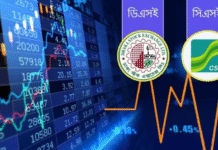
The report was unveiled on Wednesday at the UNESCAP headquarters in Bangkok
Bangladesh’s average annual foreign direct investment (FDI) inflows has grown by 13.3% in the last five years, larger than the Asia-Pacific’s 2.9% average annual FDI growth, according to a report of the United Nations Economic and Social Commission for Asia and the Pacific (UNESCAP).
The report was unveiled on Wednesday at the UNESCAP headquarters in Bangkok.
The country’s FDI rose by only 5.11% in the fiscal year 2017-18 compared to the previous fiscal year. Net FDI stood at $2.58 billion in FY18, which was $2.45 billion in the last fiscal year, according to Bangladesh Bank data.
FDI inflows to the Asia-Pacific region are also expected to continue in their downward trend next year, as evident from a 4% drop in 2018, the UNESCAP report said.
“On the other hand, Bangladesh’s average annual foreign direct investment (FDI) outflow has grown by 58.3% in the last five years, larger than the Asia-Pacific’s 3.5% average annual FDI outflow growth,” the report said.
In 2017 Bangladesh experienced an increase in FDI outflows by 319%, the commission explained in its annual report titled “Asia-Pacific Trade and Investment Report”.
Effect of US-China trade war on FDI
According to the report, the ongoing trade war between China and the US will bring more work orders and FDI for the garment sector of Bangladesh.

“Major players in the garment industry in the Asia-Pacific region, such as Bangladesh and Vietnam, are expected to benefit by acquiring a larger share in exports to the US, and thus attracting more investment,” said the report.
An upward trend was recorded by the UNESCAP, despite lingering concerns about the sustainability of the Bangladesh garment sector.
However, UNESCAP also warned that the Asia-Pacific economy will be hindered if the trade war prolongs, explaining that the trade tensions have begun to disrupt existing supply chains and dampen investor confidence.
“If the trade tensions remain, export growth may slow to 2.3% in 2019, compared to a nearly 4% growth in export volume in 2018,” said the report.
Tariff hikes are expected to cut regional GDP by a little over $40 billion, resulting in the loss of jobs in the region’s labour-intensive countries.
The region will see a net loss of 2.7 million jobs due to the trade war, with unskilled workers, often women, shouldering a severe impact.
If the trade war further escalates in 2019—leading to a drop in investor and consumer confidence—the global GDP could be cut by nearly $400 billion, also driving regional GDP down further $117 billion.
Almost 9 million people could be put out of work in the region, with many more workers also moving to new jobs in different sectors.
At the same time, Bangladesh’s FDI inflows declined by 7.8% in 2017, the report added.
Source: Dhaka Tribune.









